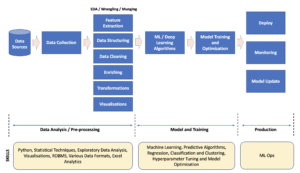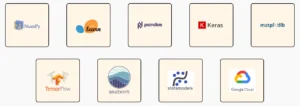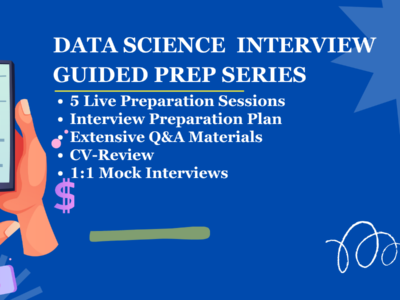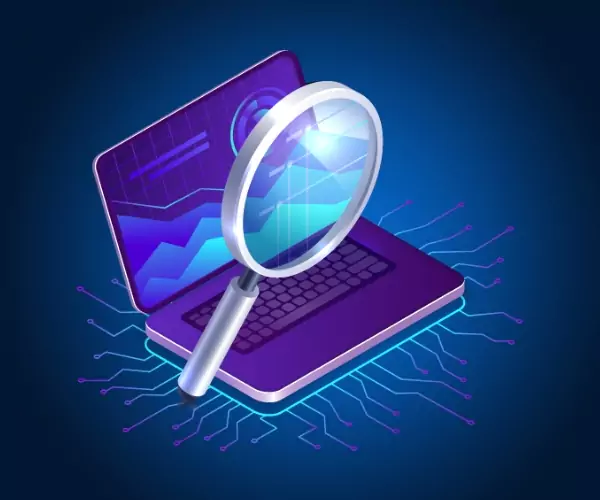Post Graduate Program on Applied Data Science with Deep Learning and Specialisation (TEKS-RISE)
Total Curriculum Duration – 4 months + 1 month (Specialisation)
Data science became a career buzzword for IT professionals when a Harvard Business Review termed it as “The Sexiest Job of the 21st Century”. According to the U.S. Bureau of Labour Statistics……….
Course Introduction
Total Curriculum Duration – 4 months + 1 month Specialisation
Data science became a career buzzword for IT professionals when a Harvard Business Review termed it as “The Sexiest Job of the 21st Century”. According to the U.S. Bureau of Labour Statistics, growth for data science jobs skills will grow about 30% year on year through 2026. At this point in time in 2021, the average salary of a Data Scientist / Analyst is to the tune of US$ 120K annually.
Why Data Science is a sought after skill for employers: Companies across industries are rushing towards automated decision making for all of their departments and that is possible through the application of various Data Science, Analytics, Machine Learning and Deep Learning skills. Every functional field in any company are seeking out opportunities to keep making their systems smarter and decisions smarter – be it automated voice assistants, smart cars, smart factories, smart marketing and advertising, smart sales predictions, smart investment decisioning and many more.
Skills Required for Data Scientists
If it is your goal is to become a Data Scientist, you have to first understand what it takes to become one, the skills and competencies that you should learn. Data Science is an amazingly interesting field, full of interesting concepts and power to create magic from Data.
Comprehensive knowledge on Deep Learning, ML-Ops and AI/ML Product Development are critical knowledge areas for any Data Scientist/Data Engineer/Machine-Learning Professional. This course places a lot of focus into these areas so that there is no learning gap when you start on a Data Science/Machine Learning role.
The curriculum prepares you to be a leader in this field through mastery of core data science concepts like Statistical Analysis of Data, Exploratory Data Analysis Techniques using Python, powerful Visualizations, Machine Learning, Deep Learning and Model Deployment in Production. By diving deep on key topics as above in a fully practical way, you’ll be prepared to succeed within today’s organizations. You’ll also work with real data sets from top companies as you build a work portfolio that showcase your skills. Learn the systems and techniques that help organizations overcome data overload and make smart decisions.
Curriculum Approach
Curriculum for this Applied Data Science program has been modelled around the life-cycle of Data Science Projects. There is special emphasis on selection of Languages, Algorithms, Libraries, Tools, Projects and Assignments that enable our learners to achieve that. There is special emphasis on Deep Learning and applications of Deep Learning for solving complex problems, ML-Ops so that learners have a hands-on exposure on what happens in real-life situations in terms of going live with your models and maintaining them in production. We also spend a week on industry trends and ML/AI product development practices and mechanics. These topics and exposures will enable our learners with the ability to take up a wide-variety of challenges and job roles.

Course Features
- Exploratory and Collaborative Programming
- Business Domain Understanding
- Quizzes, Assignment and Capstone
- Data Science Leadership
- Career Oriented Course
- Pre-requisites and Students Backgrounds
- Renowned Faculty
- Real-life Projects
- ML-Ops
- Machine Learning Product Development
- Placement Assistance
Program Structure
- Mode – Live Online, Instructor Led
- Days/Timings – Weekend Batches / Morning 10:00 am – 1 pm (Saturday/Sunday)
| Program | Duration |
|---|---|
| Post Graduate Program on Applied Data Science with Deep Learning and Specialisation (TEKS-RISE) | 4 Months |
| Specialisation Options (R Language, Tableau) | 1 Month |
| Mode | Days/Timings |
|---|---|
| Live Online, Instructor Led | Weekend Batches / Morning 10:00 am – 1 pm (Saturday/Sunday) |
Key Points Covered
- Data Acquisition Techniques
- Exploratory Data Analysis using Pandas, Numpy libraries
- Visualizations using Matplotlib, Seaborn libraries
- Modelling and Predictive Techniques – Supervised Learning, Unsupervised Learning, Prediction Problems, Classification Problems, Clustering using Scikit Learn, StatsModel libraries
- Applied Part – Portfolio Projects
- Deep Learning with CNN, RNN, LSTM, Attention models using Tensorflow and Keras
- ML-Ops on GCP platform
- Data Science Leadership
Python will be used as the primary programming language throughout the course. Teksands will organise pre-course Python sessions for those with little or no exposure to Python.
Libraries Covered

FAQs
1. What are the Professions/Job Roles in Data Science & Analytics space?
Data Science and Predictive Analytics has served a multitude of functions and job needs and a lot of Job Roles are created in organizations in the last few years. Some of the prominent Job Roles in this space are listed below:
Data Scientist: Data Scientists would have the responsibility of understanding and analysing all the data the organisation has and create Data Driven products and solutions to create businesses processes more efficient, drive automation, create decision systems, future prediction systems, etc.
Data Architect: Data Architects would typically analyse the organisational Data Schemas, design new schemas for newer data driven systems , tune existing data schemas, optimise organisational Mete Data and all data repositories including ETL Systems.
Data and Analytics Manager: Responsible for managing and leading Data initiatives in the organisation, including leadership in ETL programs, Decision Systems programs, leading analytics teams, etc.
Data Analyst: Data Analysts typically gather and analyse data within divisions and organisation for the purpose of building Insights and Analytics solutions and systems using a range of tools, techniques including statistics. This role is highly important for the leadership of any organisation to develop understanding of business trends.
Machine Learning Engineer: Responsible for developing sophisticated Machine Learning Models that are to create various Decision, Prediction, Classification, Clustering systems on Business Data. All the roles above and the plethora of roles this space is offering are growing rapidly in demand and skills shortfall is even expanding leading to high salaries for every skilled personnel in these fields.
Given “Data is the new Fuel”, demand for professionals in these fields in the many years to come will continue to expand unabated creating massive opportunities for data professionals.
2. What is the skill demand in this field?
With Data Science applications booming through businesses leading to saving costs, better profitability and driving newer business models and products, the demand for these skills have skyrocketed. Literally, every business today is after quality skilled professionals in Data Science and Analytics. Not only they are looking for Data Science and Predictive Analytics skills to create new solutions, but preferring these as must-have skills in all other fields to drive continuous automation and efficiency. Even Business and Operations personnel are today are equipping themselves with foundational knowledge in these areas to save costs through automation.
Some statistics:
- 70-80% Year on Year New Job Numbers Growth in Data Science and related skills
- 15-20% Year on Year Average Salary Growth in these fields
- 85% of the Companies are Investing and expanding their Data Science Teams rapidly
- In 2020-21, there is a net shortage of 250,000+ skilled resources in these fields
- 2 Years is approximate Data Science Staff Tenure in companies
3. What is the approach of Teaching?
The course is completely based on practical approaches of teaching. Learners will have intense exposure to real code and data while learning the concepts on the go. We will also provide you all the codes used in training and also additional problems for you to work on and practice.
The Delivery method is Online, Live Classes led by Professional, Industry Experienced Instructors.
4. What is the course duration?
20 Hours
Weekday Courses: Over 2 Weeks, all Weekdays (Monday to Friday), 2 hour Sessions per day.
Weekend Courses: Over 3 Weekends, Saturdays and Sundays, 3.5 hour Sessions per day.
(Please check your specific course schedule)
5. Is there any software Requirements for this course?
- Laptop with Windows 7, 8, 10 / MacOS / Linux
- Internet Connectivity
- Latest Chrome / Firefox Browser
- Microsoft Excel
- Python Version 3 or above (https://www.python.org/downloads/)
- Anaconda Platform (https://www.anaconda.com/distribution/)
6. Who are the instructors for this course?
All courses on Teksands are taught by Industry Professionals, highly qualified and focused Research Scholars from Reputed University
Curriculum
Curriculum
- 21 Sections
- 146 Lessons
- 21 Weeks
- Week 1: Introduction to Data Science6
- Week 1-2: Collecting and Processing Data7
- Week 2-3: Data Science Concepts7
- Week 4: Statistical Techniques5
- Week 4-5: Exploratory Data Analysis9
- Week 5-6: Predictive Modelling / Machine Learning 1 - Linear Regression8
- Week 6-7: Predictive Modelling / Machine Learning 2 - Logistic Regression8
- Week 7-8: Predictive Modelling / Machine Learning 4 - Decision Tree and Random Forest8
- Week 8: Predictive Modelling / Machine Learning 5 - Dimensionality Reduction9
- Week 9: Predictive Modelling / Machine Learning 6 - Advanced Classifier: SVM6
- Week 9-10: Predictive Modelling / Machine Learning 7 - Clustering using K-Means8
- Week 11: Neural Networks and Deep Learning8
- Week 12: CNN and Image Processing8
- Week 13: RNN and LSTM7
- Week 14: Natural Language Processing with RNN and Attention Models7
- Week 15: ML-Ops using Google Cloud Platform7
- Week 14-17: Capstone Project3
- Week 16: Deep Learning Product Development5
- Specialisation Options0
- Option 1: Tableau11
- Option 2: R Language9





